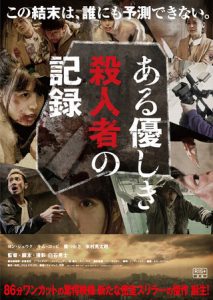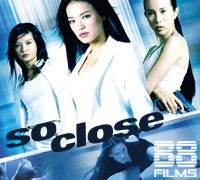Director: Koji Shiraishi
Writer: Koji Shiraishi
Cast: Kim Kkobbi, Yeon Je-Wook, Ryotaro Yonemura, Tsukasa Aoi, Yeo Min-Jung, Koji Shiraishi
Running Time: 86 min.
By Paul Bramhall
Japanese director Koji Shiraishi had, for a long time, carved out a niche for himself as the guy who makes grimy found-footage/docu-horror flicks. The likes of 2005’s Noroi: The Curse, 2009’s Occult, and 2011’s Cho Akunin, all feature some kind of first person perspective revolving around the supernatural or unpleasant endeavours. He’s also ventured outside of the format, with the likes of 2007’s The Slit Mouthed Woman and 2009’s Grotesque (which remains banned in the UK), and perhaps none more so than with 2016’s Sadako vs. Kayako, which saw his first foray into mainstream horror filmmaking. Adapting what originally started out as an April Fool’s joke, the concept of pitting the vengeful spirits from the Ring and Ju-On franchises proved too much of a temptation to resist, and Shiraishi has yet to return to his low budget horror roots since.
However before he entered the mainstream fray, his last movie before making Sadako vs. Kayako remained firmly in the found footage genre, with A Record of Sweet Murder. Made in 2014, the production is a unique entry in Shiraishi’s filmography, as it takes the form of a co-production with Korea. Co-productions between Japan and Korea tend to be as rare as hen’s teeth (does anyone remember Seoul?), mainly due to tensions between the 2 countries, so to see a collaboration such as this one is almost enough to warrant a viewing in and of itself.
The Korean investment sees A Record of Sweet Murder set in a downtrodden suburb of Seoul, with its 2 leads also cast as Koreans. Indie actress Kim Kkobbi, who first came on the radar with her outstanding performance alongside Yang Ik-june in his semi-autobiographical Breathless in 2008, here plays a journalist who’s been contacted by a childhood friend. One who just so happens to have escaped from a mental institution and killed 18 people. The childhood friend is played by Yeon Je-wook (The Witness), and his reaching out to Kkobbi comes with a strange condition – he wants to give her an exclusive, and requests she come to the fifth floor of an abandoned apartment block with a Japanese cameraman, and promise that no matter what happens they won’t stop filming.
Kkobbi duly obliges, despite having many questions (one of them being why the cameraman specifically needs to be Japanese), and the pair are soon met by a slightly manic Je-wook outside the apartment, wielding a knife and threatening to kill them if they dare stop filming at any point. It’s soon revealed through a confession that he’s actually killed 25, and that the voice of God he’s been hearing in his head requires him to kill 27. After murdering all 27 victims, he believes that both him and Kkobbi’s childhood friend who was killed in a hit and run many years ago, will be undone. However for his last 2 victims, Je-wook reveals that God has given him specific instructions that they need to be Japanese, and show “the power of love”.
It’s an intriguing premise, and one which comes with an even more intriguing execution. When A Memory of Sweet Murder opens we’re already seeing things from the perspective of the Japanese cameraman who, in a stroke of ingenuity, is played by Shiraishi himself. This results in the director occasionally appearing on camera in a rare acting (if you could call it that) role, however the boldest move that A Memory of Sweet Murder has up its sleeve, is that for 80 of its 86 minute runtime, it plays out as one uninterrupted single take shot.
One can only imagine what kind of logistical challenge this must have presented (and how many takes it must have taken!), and understandably the majority of the runtime is limited to the main room of the abandoned apartment that Kkobbi, Je-wook, and Shiraishi find themselves in. There are only 4 other actors throughout the whole of the single take, 2 a pair of victims that Je-wook reveals he already captured, and we glimpse briefly in another room, and the other 2 a loved up Japanese couple who stumble across the trio on their way to the rooftop.
The couple are played by Ryotaro Yonemura and Tsukasa Aoi (also their characters names), and are A Memory of Sweet Murder’s biggest detriment. Yonemura, who’s had minor roles in the likes of Sono Sion’s The Land of Hope, hams up his characters Yakuza style machismo to the point that it comes across like a gurning contest. His brash character is able to turn the tables on Je-wook’s unstable psycho, however his overly pronounced rolling of every ‘r’, and wild eyed ranting, quickly begins to overstay its welcome. As for Aoi, when you cast an AV (Adult Video – for those wondering) actress in a movie, you know they’re only there for one reason. Aoi’s closest claim to mainstream fame is likely appearing as a sexed up version of Sailor Moon, in the Chapman To starring comedy Naked Ambition 2, from 2014 (she also featured in 2014’s God Tongue Kiss Pressure Game: The Movie, in her native Japan. Don’t ask.).
Je-wook’s sexual assault of a bound Aoi, played out while Yonemura excitedly watches on, claiming she’s always fantasised of such a scenario, adds little to the plot, nor does the subsequent sex scene between the pair, when Aoi reveals to Yonemura that the experience turned her on so much she needs to do it again. The confined environment that these scenes play out in leave Kkobbi awkwardly stood in the corner of the room, doing her best to maintain a constant expression of fear, while also feeling distinctly adrift in a movie which she’s actually the star of. What can’t be denied though, is that the brief excursion into kinky sex marks A Record of Sweet Murder as an unmistakably Japanese product, despite both the Korean setting and performers.
There’s no mistaking that Shiraishi’s last venture into the found footage genre is a low budget affair, which sometimes makes it feel like an endurance test, while other times you’re left marvelling at his technical prowess. The whole one take setup means that there’s occasional lags. From the moment the movie opens, and Kkobbi points out that the building in the distance is the one where Je-wook wants to meet, the whole walk up to the building (and then up five flights of stairs!) makes you appreciate the importance of editing. However when things begin to go pear shaped, and exchanges start to get violent and bloody, Shiraishi’s use of the camera to effectively convey impacts and contact within a very limited space can only be called admirable.
Indeed in many ways A Record of Sweet Murder is one of those unique entries into the world of cinema, that when you’re watching it you may not necessarily be enjoying that much, but as the credits roll you realise just how invested you were. As the music rolled over the end credits, it was only then that it struck me that there hadn’t been a single piece of music for the almost 90 minute duration, however I’d still been kept glued to the screen regardless. As undeniably rough around the edges as it is, there’s a talent at work which isn’t immediately apparent on the first watch, but a number of small nuanced touches between the yelling and depravity are there for the observant viewer.
In the closing minutes events take a decidedly unexpected turn. For all of the arduous and gruelling events that have transpired over the last 80 minutes, Shiraishi has a trick up his sleeve that’s both imaginative and cathartic. It’s a bold move, and a welcome one, as it acknowledges that as the audience we’ve also been experiencing first-hand the horrors that both Kkobbi and Shiraishi (in his cameraman guise) have had to endure for over an hour. Realising that we need some kind of payoff for getting as far as we have, as an audience we’re duly rewarded. I’ll be honest and say that, while many may see the ending coming from a mile away, I found myself satisfied with the outcome that it presented, and it immediately put a certain level of previously unseen context around everything we’ve just been through. Based on this, for those looking for something a little different, A Record of Sweet Murder may just fit the bill.
Paul Bramhall’s Rating: 6/10





Nice review. Though it sounded like you appreciated more than a 6 … Its interesting how the Japanese have used the found footage genre .. I saw one such film, I forget what it was called, it may have been a combination of found footage/POV and other filmmaking styles, but it was about some underground world … May have been the same director? Like this one, had a low budget edge to it.
Probable the pretty interesting Marebito by Takashi Shimizu.
Interesting review. Did they really do the whole movie in one take, or was there trickery to make it look that way? (Rope, Silent House)
I actually do remember Seoul! It was a good idea except for Choi Min-Soo being a weakling through most of the affair with small scale action.
Damn, I meant Nagase.
It’s a genuine continuous shot, which has both its pros and its cons, but either way it’s definitely admirable.
Oh, and I think you and I are in the select few who’ve had the misfortune of sitting through ‘Seoul’. 😛
Wow. Most continuous shot movies use tricks to hide the camera cuts, so that is an impressive feat. Alfred Hitchcock’s Rope had to have camera cuts because the camera back then could only hold a limited amount of film.
I guess the concept of doing everything in one take is just like in live theatre. I’d like to see more film makers do that.